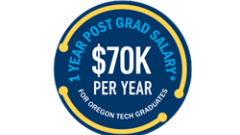Program Accreditation
The Renewable Energy Engineering baccalaureate program is accredited by the Engineering Accreditation Commission (EAC) of ABET, Inc.,
http://www.abet.org. ABET is a specialized accrediting board recognized by the Council for Higher Education and/or the Secretary of the U.S.
Department of Education.
Program Mission
The mission of the Bachelor of Science in Renewable Energy Engineering degree program is to prepare students for the challenges of designing, promoting and implementing renewable energy solutions within society's rapidly-changing energy-related industry cluster, particularly within Oregon and the Pacific Northwest. Graduates will have a fundamental understanding of energy engineering and a sense of social responsibility for the implementation of sustainable energy solutions.
Program Educational Objectives
- BSREE graduates will excel as professionals in the various fields of energy engineering.
- BSREE graduates will be known for their commitment to lifelong learning, social responsibility, as well as professional and ethical responsibilities in implementing sustainable engineering solutions.
- BSREE graduates will excel in critical thinking, problem solving and effective communication.
Program Student Learning Outcomes
- An ability to identify, formulate, and solve complex engineering problems by applying principles of engineering, science, and mathematics.
- An ability to apply engineering design to produce solutions that meet specified needs with consideration of public health, safety, and welfare, as well as global, cultural, social, environmental, and economic factors.
- An ability to communicate effectively with a range of audiences.
- An ability to recognize ethical and professional responsibilities in engineering situations and make informed judgments, which must consider the impact of engineering solutions in global, economic, environmental, and societal contexts.
- An ability to function effectively on a team whose members together provide leadership, create a collaborative and inclusive environment, establish goals, plan tasks, and meet objectives.
- An ability to develop and conduct appropriate experimentation, analyze and interpret data, and use engineering judgment to draw conclusions.
- An ability to acquire and apply new knowledge as needed, using appropriate learning strategies.
Summary of Program Student Learning Outcomes
The Electrical Engineering and Renewable Energy faculty formally assessed the student learning outcomes summarized in the annual program assessment report. Additional details can be found in department assessment records.
Curriculum Map
The curriculum map for the Renewable Energy Engineering program can be found on the catalog web page on the Oregon Tech website, www.oit.edu/catalog.






